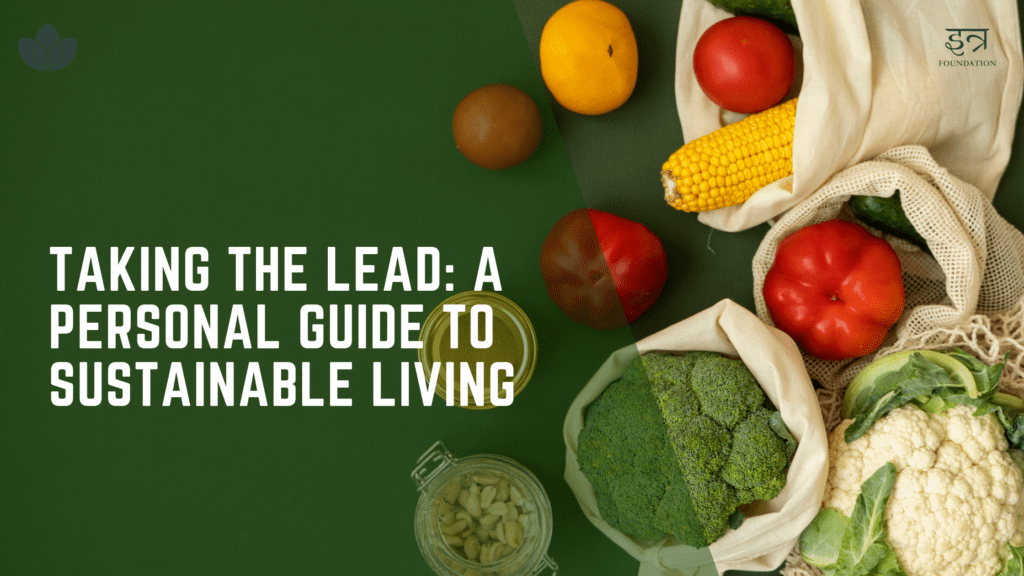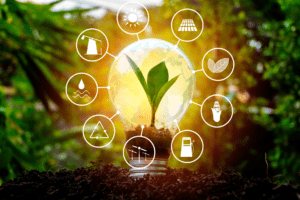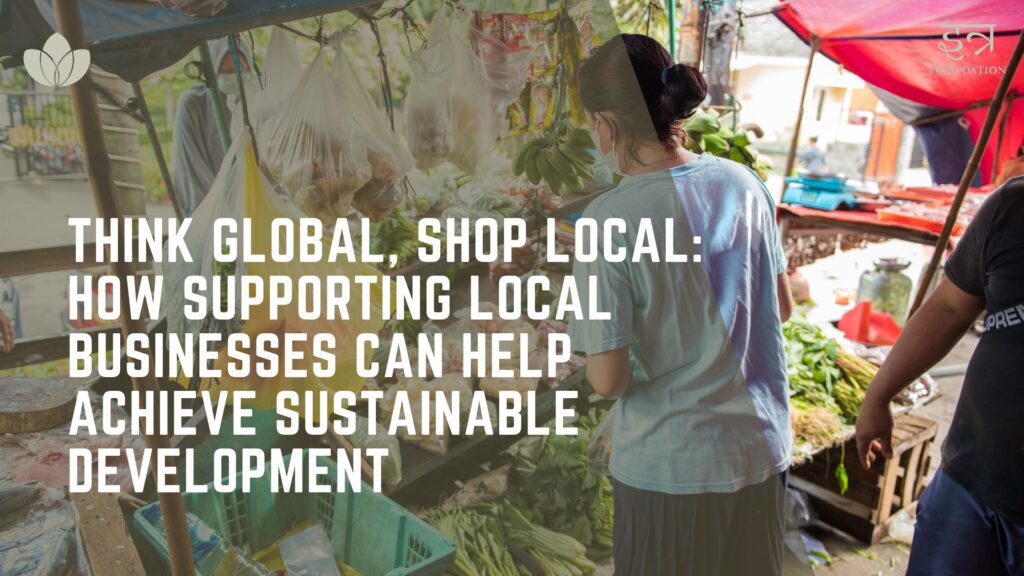Sustainability is about taking care of the earth and its resources so that future generations can have them too. It’s important to be sustainable because if we keep using resources at the rate we are now, we’ll run out and cause damage to the environment. Climate change, pollution and deforestation are examples of problems caused by not being sustainable. But by making small changes in our daily lives, we can help protect the earth for the future. It’s about being mindful of the impact of our actions on the environment and making choices that reduce our ecological footprint.

Sustainability is not just a choice, but a responsibility we all share for the future of our planet. It’s about understanding that every action we take has a ripple effect on the environment and future generations. It’s about being mindful of how we use energy, food and products and making conscious choices that reduce our ecological footprint.
The truth is, we are running out of time to take action. Climate change, pollution, and deforestation are just a few of the consequences of our unsustainable way of living. But it’s not too late to make a difference. By making small changes in our daily habits, we can collectively create a more sustainable and livable future. Whether it’s by using public transportation, eating less meat, choosing sustainable and ethically-made products, or investing in renewable energy, every step counts.
It’s time to take ownership of our actions and make the necessary changes to create a more sustainable future for all. It’s not just about protecting the environment but also about creating a more equitable and just society for all. Together, we can create a sustainable future for generations to come.
Simple steps to lower energy consumption and transition to renewable energy
- Reduce energy consumption at home: One of the most effective ways to reduce energy consumption is to make sure that lights and electronics are turned off and unplugged when they’re not in use. This simple habit can help to lower your electricity bill and reduce your carbon footprint.
- Invest in energy-efficient appliances: Another way to reduce energy consumption is to invest in energy-efficient appliances such as LED lights, Energy Star certified appliances and smart power strips. These appliances use less energy and can help to lower your electricity bill in the long run.
- Transition to renewable energy sources: One of the most important steps in reducing energy consumption is transitioning to renewable energy sources such as solar and wind power. These sources of energy are clean, renewable and do not emit greenhouse gases. They also provide energy security, as they are not dependent on finite resources like fossil fuels.
- Government incentives: Government of India provides various incentives and programs to encourage the transition to renewable energy. These incentives can include financial assistance for the installation of solar panels, grants for research and development, and tax credits for purchasing electric vehicles.
- Long term impact: By taking steps to reduce energy consumption and transitioning to renewable energy sources, we can help to mitigate climate change and create a more sustainable future. Additionally, the transition to renewable energy can also create jobs and improve energy security in the long run.
Greening Your Commute: Easy Ways to Reduce Transportation Impact and Go Electric

- Carpool or use public transportation: Carpooling or using public transportation instead of driving alone is an effective way to reduce the number of cars on the road and the emissions they produce. This not only helps to reduce traffic congestion and air pollution but also saves money on fuel costs. Public transportation in India is also becoming more efficient and convenient, with many cities investing in metro rail and bus rapid transit systems.
- Biking or walking: Biking or walking as an alternative mode of transportation can be a great way to reduce emissions and promote a healthier lifestyle. It’s a zero-emission mode of transportation and has the added benefit of providing physical exercise. Many Indian cities are also investing in bike-sharing programs and building bike lanes to make it easier for people to bike or walk to work or school.
- Switch to electric or hybrid vehicles: Electric and hybrid vehicles are powered by electricity or a combination of electricity and gasoline and emit far fewer emissions than traditional gasoline-powered cars. They also require less maintenance, have lower fuel costs and offer an overall more sustainable transportation option. Government of India also provides various incentives and programs to encourage the purchase of electric or hybrid vehicles, such as subsidies, tax credits and exemptions from certain taxes.
- Government incentives: Government of India also provides various incentives and programs to encourage the purchase of electric or hybrid vehicles, such as subsidies, tax credits and exemptions from certain taxes.
- Long-term impact: By reducing our reliance on personal vehicles and transitioning to electric or hybrid vehicles, we can help to mitigate air pollution and reduce greenhouse gas emissions. By adopting these habits, we can also contribute to the development of sustainable transportation systems and a more livable future for all.
Impact of Food Consumption and How to Make Sustainable Choices

- The environmental impact of factory farming: Factory farming, also known as industrial agriculture, is a major contributor to greenhouse gas emissions, deforestation, water pollution and loss of biodiversity. The intensive use of pesticides, fertilizers and antibiotics in factory farming also has negative impacts on human health.
- Reducing the impact of factory farming: One way to reduce the impact of factory farming is to eat less meat and choose organic, locally-sourced produce. Eating a plant-based diet can also help to reduce greenhouse gas emissions, water usage and land use. Choosing organic food also helps to reduce the use of pesticides, fertilizers and antibiotics that are harmful to both human health and the environment.
- Growing your own food: Another way to reduce the impact of factory farming is to grow your own food or participate in community gardens. This not only helps to reduce the environmental impact of food transportation but also promotes a healthier lifestyle and a sense of community.
- Sustainable farming practices: To learn about sustainable farming practices, resources such as books, websites, and workshops are available. These resources can provide information on organic farming, permaculture, agroforestry and other sustainable farming practices. Some organizations in India also provide training and support for sustainable farming practices.
- Conclusion: By understanding the environmental impact of factory farming and making sustainable food choices, we can help to reduce greenhouse gas emissions, water usage, and land use. By growing our own food or participating in community gardens, we can also promote a healthier lifestyle and a sense of community. Additionally, by learning about sustainable farming practices, we can contribute to the development of more sustainable food systems.
Impact of Fast Fashion and How to Make Sustainable Choices

- The environmental impact of fast fashion: Fast fashion is a term used to describe the mass production and quick turnover of low-cost clothing items. This industry is a major contributor to environmental pollution and waste. The process of manufacturing and shipping clothing items also has a significant environmental impact, including the use of water, energy and chemicals.
- Reducing the impact of fast fashion: One way to reduce the impact of fast fashion is to buy second-hand clothing and choose sustainable and ethically-made clothing. Buying second-hand clothing not only helps to reduce the environmental impact of clothing production but also saves money. Choosing sustainable and ethically-made clothing also helps to support fair labor practices and reduce the use of water, energy and chemicals.
- Consuming less in general: Another way to reduce the impact of fast fashion is to consume less in general. This not only helps to reduce the environmental impact of production but also saves money and reduces clutter in your home. Minimalism, conscious consumerism and circular economy are the ways to achieve this.
- Resources for sustainable consumption: To learn about sustainable consumption practices, resources such as books, websites and workshops are available. These resources can provide information on sustainable fashion, circular economy, conscious consumerism and other sustainable consumption practices. Some organizations in India also provide training and support for sustainable consumption practices.
- Conclusion: By understanding the environmental impact of fast fashion and making sustainable consumption choices, we can help to reduce pollution and waste, support fair labor practices and conserve resources. By consuming less in general, we can also save money and reduce clutter in our homes. Additionally, by learning about sustainable consumption practices, we can contribute to the development of more sustainable systems and a more livable future for all.
Conclusion
we have discussed various aspects of sustainable living such as energy consumption, transportation, food consumption and general consumption. We have also discussed ways to make small changes in our daily life to reduce our ecological footprint and live more sustainably.cc
By taking small steps such as turning off lights and unplugging electronics when not in use, investing in energy-efficient appliances, transitioning to renewable energy sources, carpooling, using public transportation, biking or walking, choosing organic and locally-sourced produce, growing our own food, buying second-hand clothing and choosing sustainable and ethically-made clothing, We can make a big difference in protecting the earth for future generations.
ITRA encourages readers to stay informed about government policies and programs that support sustainable living and to take advantage of the resources available for learning about sustainable practices. It’s important to remember that sustainability is not just about protecting the environment, but also about creating a more equitable and just society for all. By making small changes in our daily life, we all can contribute to the creation of a sustainable future for generations to come.






